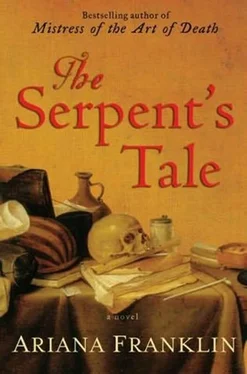“Now.” She placed the daughter’s hand on Mistress Reed’s pubic region. “Press.” Still supporting the little torso, she made a cut in the mother’s perineum. There was a slither and, because the knife was still in her fingers, she had to catch the baby in the crook of her elbows.
The daughter was shouting, “That’s out, Dadda.”
Master Reed appeared at the head of the ladder in a smell of cow dung. “Gor dang, what is it?”
Stupid with relief, Adelia said, “It’s a baby.” Ugly, bloodied, soapy, froglike, with its feet tending toward its head as they had in the womb, but undamaged, breathing, and, when tapped on its back, objecting to life in general and its emergence into it in particular-to Adelia, as beautiful a sight and sound as the world was capable of producing.
“That’s as may be, but what is it?”
“Oh.” Adelia put down the knife and turned the miracle over. It was male, quite definitely male. She gathered herself. “I believe the scrotum swelling to be caused by bruising and will subside.”
“He’s a’going to be popular if it don’t, ain’t he?” Master Reed said.
The cord was severed, Mistress Reed was stitched and made decent for visitors, and the baby was wrapped in a fleece and put into his mother’s arms.
“Here, missis, you got a name as we can call him after?” her husband wanted to know.
“Vesuvia Adelia Rachel Ortese Aguilar,” Adelia said apologetically.
There was silence.
“What about him?” Master Reed pointed at the tall figure of Mansur, who had come up with the siblings to view the miracle.
“Mansur bin Fayîî bin Nasab Al-Masaari Khayoun of Al Amarah.”
More silence.
Mansur, whose alliance with Gyltha was enabling him to understand English even if it gave him little chance to speak it, said in Arabic, “The prior comes, I saw his boat. Let them call the boy Geoffrey.”
“Prior Geoffrey’s here?” Adelia was down the ladder in a trice and running to the tiny wooden platform that served as a quay-all homes in the fenland had access to one of its innumerable rivers, its children learning to maneuver a coracle as soon as they could walk.
Clambering out of his barge with the help of a liveried oarsman was one of Adelia’s favorite people. “How are you here?” she said, hugging him. “ Why are you here? How is Ulf?”
“A handful, but a clever handful. He thrives.” Gyltha’s grandson, and, so it was said, the prior’s as well, had been set to serious study at the priory school and would not be allowed to leave it until the spring sowing.
“I am so pleased to see you.”
“And I you. They told me at Waterbeach where you were gone. It appears that the mountain must come to Mohammed.”
“It’s still too mountainous,” Adelia said, standing back to look at him. The prior of Saint Augustine’s great canonry in Cambridge had been her first patient and, subsequently, her first friend in England; she worried about him. “You have not been keeping to my diet.”
“Dum vivimus, vivamus,” he said. “Let us live while we live. I subscribe to the Epicureans.”
“Do you know the mortality rate among Epicureans?”
They spoke in fast and classical Latin because it was natural to them, though it caused the men in the prior’s barge to wonder why their lord was concealing from them what he was saying to a woman and, even more wondrous, how a woman could understand it.
“Oh, but you are well come,” Adelia said, “just in time to baptize my first delivery. It will comfort his parents, though he is a healthy, glorious child.”
Adelia did not subscribe to the theory of Christian infant baptism, just as she didn’t subscribe to any of what she regarded as barbarous tenets held by the world’s three major faiths. A god who would not allow that baby upstairs into the Kingdom of Heaven if it died before being sprinkled with certain words and water was not a god she wanted anything to do with.
But his parents regarded the ceremony as vital, if only to ensure the boy a Christian burial should the worst happen. Master Reed had been about to send for the shabby, peripatetic priest who served the area.
The Reed family watched in silence as bejewelled fingers wetted their son’s forehead and a voice as velvety-rich as its owner’s vestments welcomed him into the faith, promising him life eternal and pronouncing him “Geoffrey in the name of the Father, and of the Son, and of the Holy Ghost, amen.”
“Fen people never say thank you,” Adelia apologized, as, carrying her baby, she joined the prior in his barge, the dog called Ward scrambling in with her, leaving Mansur to follow in their rowing boat. “But they never forget, either. They were grateful but amazed. You were too much for them, as if archangel Gabriel had come down in a shaft of gold.”
“ Non angeli, sed angli, I fear,” Prior Geoffrey said, and such was his fondness for Adelia that he, who had lived in Cambridgeshire for thirty years, remained complacent at being instructed in the ways of the fens by this woman from southern Italy.
Look at her, he thought, dressed like a scarecrow, accompanied by a dog that will necessitate fumigation of the bench it sits on, the finest mind of her generation hugging her bastard for joy at having delivered a brat into a hovel.
Not for the first time, he wondered about her parentage, of which she was as ignorant as he. Brought up by a Salernitan couple, a Jew and his Christian wife, who’d found her abandoned among the stones of Vesuvius, her hair was the dark blond sometimes seen on Greeks or Florentines. Not that anybody could see it at the moment, hidden in that unspeakable cap.
She is still the oddity she was when we first met on the road to Cambridge, Prior Geoffrey thought. I returning from the pilgrimage to Canterbury, she in a cart, accompanied by an Arab and a Jew. I put her down as their trull, not recognizing the virginity of a scholar. Yet when I began to bawl in pain-Lord, how I bawled, and Lord, what pain it was-despite all my company of Christians, only she played the Samaritan. In saving my life that day she reduced me, me, to stammering adolescence by manipulating my most intimate parts as if they were mere tripes to be cooked. And still I find her beautiful.
She had been obeying a summons even then, brought from her work with the dead of Salerno to be part of a team in disguise led by the investigating Jew, Simon of Naples, to find out who was killing Cambridge’s children-a matter that seriously bothered the King of England because it was leading to riot and, therefore, a depletion of his taxes.
This being England and not freethinking Salerno, it had been necessary for Mansur, Adelia’s servant, to set up as the doctor, with Adelia herself pretending to be his assistant during their investigation. Poor, good Simon-even though a Jew, the prior remembered him in his prayers-had been murdered in his search for the killer, and Adelia herself had nearly lost her life, but the case had been resolved, justice imposed, and the king’s taxes restored to his treasury.
In fact, so useful had been Adelia’s forensic skill in the matter that King Henry had refused to let her return to Italy in case he should need her again. A miserly and greedy ingratitude typical of kings, Prior Geoffrey thought, even while he rejoiced that it had made the woman his neighbor.
How much does she resent this exile? It wasn’t as if she’d been rewarded. The king had done nothing-well, he’d been abroad-when Cambridge’s doctors, jealous of a successful interloper, had driven her and Mansur out of town and into the wilderness of the fens.
Sick and suffering men and women had followed them, and still did, not caring if treatment was at the hands of foreign unbelievers but only that it made them well.
Читать дальше











